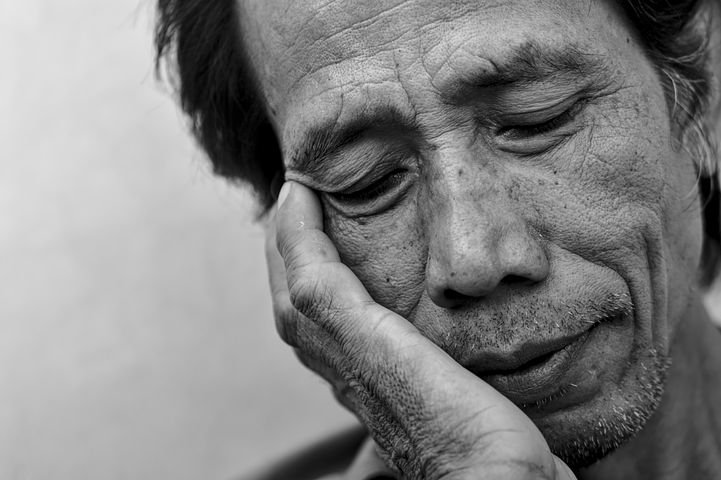
Rebuilding Our Inner Life (after a hard year of pandemic life)
“Want to learn about a different culture?—Go and live there for a year.” That’s the advice I heard as a college student preparing to do a year abroad. It proved true. You need that much time to really settle into a new experience. Part of it undoubtedly comes from experiencing all four seasons; part also surely comes from the subtle inner changes we make to accommodate to new surroundings. That said, we are now nearly a year into our pandemic experience. The idea that we would just need to “batten down the hatches” for a few months and then life would return back to normal, that idea has proven wrong. Life is different now and will continue to be. With fragmented social connections, disrupted rhythms, and so many streams of vastly different information, it is hard to know how to orient yourself.

Strengthening our Social “Muscles”
People have been asking if I am seeing people with COVID symptoms in the medical office and the answer is: “Not regularly.” That may well change as counts are going up in many places, but in general it is not the coronavirus itself that has needed a lot of medical attention, but all of the challenges around it. It is hard to think of a recent medical visit that has not been strongly influenced by living in this time of COVID.
What are we learning from living in this time? Well, if we become sick with COVID, then our immune system will be challenged to decide: what is me and what is not me? Viruses infect our cells. They need our cells to replicate and that process continues until we develop enough “knowledge” to recognize what does not belong to us (the virus) and that it should be removed. We have to burrow deep into ourselves to fight a viral infection. Once that process is completed we will have established new immunity against that process. In that particular area, with that particular virus, we now know where to draw the line of “self” and “not-self.” Antibody resistance means we have worked through a particular pathway of encounter, and it will be easier to mark the line of self/not-self if we need to go that same way in the future.

A Global Biographical Change (in which we are all shifting at the same time)
Where does change come from? Change is constant, with different people continuously making important life shifts all around us. The timing for them is usually independent and varied, so that there are always losses, moves, divorces, and births, but unless we are immediately connected to them we may not think much about them. Right now, life is different. We are all sharing a common experience of change, all around the world. It is a time of strong outer changes, which will undoubtedly fuel inner shifts that last beyond these immediate weeks and months.

Support for Weaning off of an Antidepressant
This might feel like a strange topic to bring up during a pandemic—shouldn’t we actually all be getting onto an antidepressant medication right now because of all of the hardship and worry that is happening in the world? The answer is, no, not as a first resort. We can learn from this time. We are being asked to understand ourselves in new ways and not just go back to the way things were, once outside circumstances make that possible. We are changing, and change can be very good. Consider it a kind of healing crisis.
Conventional antidepressants do have their role. They stabilize our nervous system and our emotional life and they can wonderful, life-saving medicines in the right situation. I prescribe them when needed and appreciate their support, but reserve them for when life is truly too overwhelming and there just needs to be some quiet pause….

Breathing in the Time of a Pandemic
I’ve been thinking a lot about the novel coronavirus and its illness, COVID-19, and the fact that it generally does not seem to be such a severe illness for children. That fact is unusual. We generally worry about children becoming more ill with a new virus because they have not encountered it before. The seemingly continuous “six-month-cold” that virtually every child gets when she begins school or daycare is really the repeated process of working through one infection after another. There is a whole repertoire of respiratory viruses they have never met before. With each illness process immunity builds, and in time, the inflammatory reaction becomes brisker and the child more resilient. As adults, we are surely exposed to those same viruses and bacteria all the time, but have gained protection, gained “experience” around working with them. We therefore do not have the same repeated symptoms. But meeting the coronavirus seems to be different, almost opposite. No one has existing protection from this virus–that is why it is labelled as “novel”—and yet, young age seems to be of physiologic benefit. There is something about the way younger children get sick that we should pay attention to.

The Unique Anxieties of the Nine-year Change
Do you remember when you were nine? Many people have vivid memories about particularly events or experiences at that age. Some people reflect back and become aware of how their connection with the world changed, how they began to notice new things, ask different questions. If you dig a little, a whole set of people report that this was the age when they actually got a first glimmer of their later life’s work.
What is most consistent, however, is that people remember feeling anxious. This age stands as a developmental eye of the needle, a passage, through which we first become aware of ourselves as true individuals and which naturally brings some anxiety with it.
It is vitally important to know about this threshold time of nine-years because it is now being misinterpreted. Children are too often now being diagnosed with an anxiety disorder at age nine, when we should actually view this period as an essential time of developmental transformation. We can do this if we know the context. There are good ways to help a child move successfully through this transition.

Pain is Feeling that has Become too Tightly Connected to the Body
Ever met someone who has a really weak and limp handshake, the kind where the hand flops around in your grip? It is not very satisfying. In fact, it can be a little disconcerting because you don’t feel like you have been properly able to meet or encounter the person. Where is she? What is he afraid of? If a sensation (like touch) is too small or too soft, then it is hard to register or orient to the sensation. On the other hand, if you meet someone who has an iron grip and makes you secretly worry that your fingers are being broken, that is not any better. That hurts! You think “I see you already, I acknowledge you. Let go now, please!” Too much sensation causes pain, whether it is too much grip, or too much heat from a flame, or even too much cold from an ice cube. Take any kind of sensation and exaggerate it beyond normal measure—too much touch, heat, cold, light, noise—and it can become painful. This is a concept anthroposophic medicine has been working with for nearly a century: pain is feeling that has become too tightly connected to an organ, or to a part of the body.

A Fourfold Approach to Healing
There are a lot of different terms for describing therapeutic approaches that think differently from a conventional, Western-medicine approach. For a long time, they were considered to be “alternative” therapies—meaning something completely different and separate from usual medical practice. Then the term “complementary” therapies became popular—suggesting something still different from usual practice, but which could perhaps be used alongside standard treatment and enrich it. In the last few years a newer term, “integrative medicine” has come to the fore with the understanding that we need, more and more, to weave different therapeutic perspectives and healing streams together. This change in language reflects our evolving understanding, and broadening recognition that wisdom comes in many different forms.

Building Strength for the Future, from present adversity
Health and illness follows certain foundational laws of cause and effect. Falling from some height (like a tree) risks breaking a bone; smoking increases rates of cancer. Those are fairly straight forward links that are easy to understand. We could say, the horse is clearly pulling the cart.
But there are other situations where two results seem to come parallel to each other, like the “horse” is walking just in front of, or just behind the “cart.” But there are other situations where two results seem to come parallel to each other, like the “horse” is walking just in front of, or just behind the “cart.” For example, it has been demonstrated that having heart disease puts you at higher risk of depression, and that having depression puts you at higher risk of heart disease. Also, that depression puts you at higher risk of developing diabetes, and diabetes puts you at higher risk of depression. Hmmm—which is now the proverbial horse and which is now the cart?

What is the Best Diet (for cancer)?
This comes up as an important question when people are trying to heal a tumor. Cancer is an illness that seems to magnify the importance of many of the questions and concerns that people have all of the time. It occasions extra consciousness, for we want to really be aware of what we are doing and the possible consequences. We are forced to reconsider many of the things we have previously done out of habit or convenience, and whether we should continue them or make a change. In terms of diet and cancer it is very clear that we need to choose things that support good vitality and that nourish us, and that we need to avoid things that are burdensome and depleting. Here is a brief list of several of the common themes that emerge in discussions about diet and cancer, with some introductory insights:

Sensing Like the Heart
Feel your heart. Stop, pause for a moment and see if you can sense the rhythmic beating of your heart. It is an amazing organ because it is in constant movement, so flexible and mobile that the moment you say “there, now it is contracting” it has actually already started expanding, and by the time you say it is relaxing it has again started squeezing. The heart creates an tremendous organic activity—it is not so much a pump as a physiologic archetype of balance—faithfully and continuously working through our whole lifetime, steady, steady, steady (can you imagine carrying out the same activity for 70, 80, 90 years?), yet simultaneously so dynamic that it never really rests. Because of these dueling activities it is hard to capture the essence of the heart in a single work or image; there are too many aspects.

Working with Fear
There sure are a lot of things to be afraid of in the world right now. Part of that seems related to these being turbulent times, but part of it is probably because we are connected to so many things and people and places. How many pieces of news can you really digest in a day, even if it is all good news? How many pieces of news can you digest if most of them are bad? Certainly the worrisome and scary events in the world seem to get the most press so that sometimes it can feel like everything is collapsing. That makes it hard to find places to safely orient ourselves. …

Is it ever good to get sick?
This is a very challenging question, because even daring to ask the question can seem immoral, crass, or uncaring, especially when it arises out of medical work. But at some point it becomes essential to ask this question when we strive to understand illness in the context of broader patterns of human growth and development.
The usual, reflexive answer to asking “is it ever good to get sick?” is “No.” We perceive illness as painful, dysfunctional, and representing a failure, a breaking down of the machine of the body. Sometimes this failure comes through an invader (like a viral or bacterial infection), sometimes it comes from mistreatment (poor diet, alcohol, drugs), overuse of our body, or overexposure to toxic agents….

The Etheric Body: Foundation of a Dynamic Clinical Lens
There is a great modern hope to find the kernel of good health in a check-list. As medical costs are ballooning and rates of chronic illness climb, one oft-espoused solution is to get more precise about what we as healthcare providers are doing, creating broad practice guidelines and working to universally apply them. There is the hope that if we define the basic parameters of physical health and work towards them, we will all be healthier. Body-mass index, cholesterol, blood pressure, cancer screening, vaccinations and smoking cessation become our measures of good health, and if those are within their proper parameters we can all feel good that we are keeping people healthy….